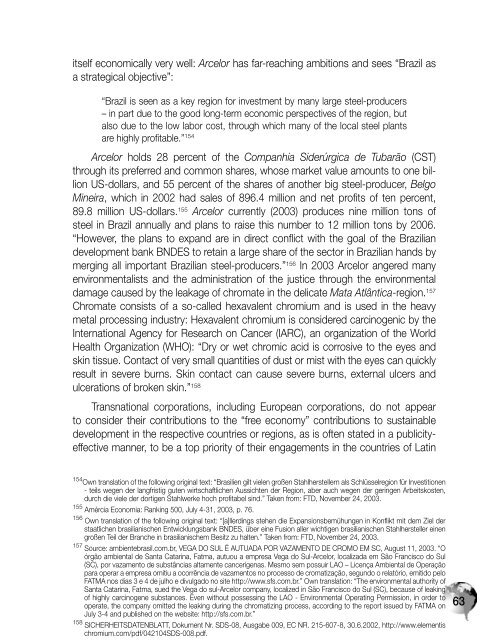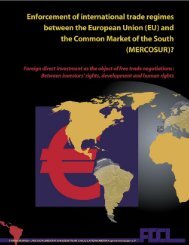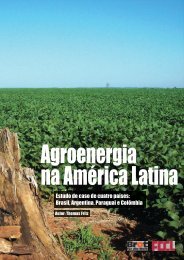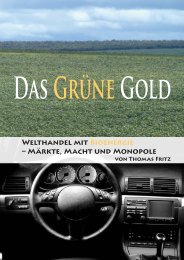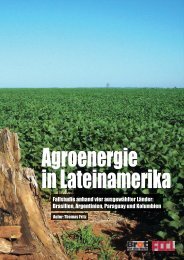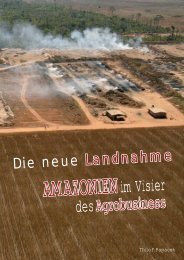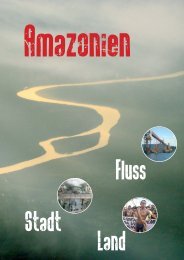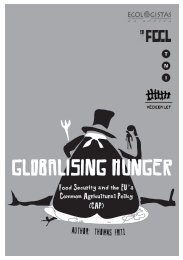(EU) and the Common Market of the South (MERCOSUR)? - FDCL
(EU) and the Common Market of the South (MERCOSUR)? - FDCL
(EU) and the Common Market of the South (MERCOSUR)? - FDCL
Create successful ePaper yourself
Turn your PDF publications into a flip-book with our unique Google optimized e-Paper software.
itself economically very well: Arcelor has far-reaching ambitions <strong>and</strong> sees “Brazil as<br />
a strategical objective”:<br />
“Brazil is seen as a key region for investment by many large steel-producers<br />
– in part due to <strong>the</strong> good long-term economic perspectives <strong>of</strong> <strong>the</strong> region, but<br />
also due to <strong>the</strong> low labor cost, through which many <strong>of</strong> <strong>the</strong> local steel plants<br />
are highly pr<strong>of</strong>itable.” 154<br />
Arcelor holds 28 percent <strong>of</strong> <strong>the</strong> Companhia Siderúrgica de Tubarão (CST)<br />
through its preferred <strong>and</strong> common shares, whose market value amounts to one billion<br />
US-dollars, <strong>and</strong> 55 percent <strong>of</strong> <strong>the</strong> shares <strong>of</strong> ano<strong>the</strong>r big steel-producer, Belgo<br />
Mineira, which in 2002 had sales <strong>of</strong> 896.4 million <strong>and</strong> net pr<strong>of</strong>its <strong>of</strong> ten percent,<br />
89.8 million US-dollars. 155 Arcelor currently (2003) produces nine million tons <strong>of</strong><br />
steel in Brazil annually <strong>and</strong> plans to raise this number to 12 million tons by 2006.<br />
“However, <strong>the</strong> plans to exp<strong>and</strong> are in direct conflict with <strong>the</strong> goal <strong>of</strong> <strong>the</strong> Brazilian<br />
development bank BNDES to retain a large share <strong>of</strong> <strong>the</strong> sector in Brazilian h<strong>and</strong>s by<br />
merging all important Brazilian steel-producers.” 156 In 2003 Arcelor angered many<br />
environmentalists <strong>and</strong> <strong>the</strong> administration <strong>of</strong> <strong>the</strong> justice through <strong>the</strong> environmental<br />
damage caused by <strong>the</strong> leakage <strong>of</strong> chromate in <strong>the</strong> delicate Mata Atlântica-region. 157<br />
Chromate consists <strong>of</strong> a so-called hexavalent chromium <strong>and</strong> is used in <strong>the</strong> heavy<br />
metal processing industry: Hexavalent chromium is considered carcinogenic by <strong>the</strong><br />
International Agency for Research on Cancer (IARC), an organization <strong>of</strong> <strong>the</strong> World<br />
Health Organization (WHO): “Dry or wet chromic acid is corrosive to <strong>the</strong> eyes <strong>and</strong><br />
skin tissue. Contact <strong>of</strong> very small quantities <strong>of</strong> dust or mist with <strong>the</strong> eyes can quickly<br />
result in severe burns. Skin contact can cause severe burns, external ulcers <strong>and</strong><br />
ulcerations <strong>of</strong> broken skin.” 158<br />
Transnational corporations, including European corporations, do not appear<br />
to consider <strong>the</strong>ir contributions to <strong>the</strong> “free economy” contributions to sustainable<br />
development in <strong>the</strong> respective countries or regions, as is <strong>of</strong>ten stated in a publicityeffective<br />
manner, to be a top priority <strong>of</strong> <strong>the</strong>ir engagements in <strong>the</strong> countries <strong>of</strong> Latin<br />
154 Own translation <strong>of</strong> <strong>the</strong> following original text: “Brasilien gilt vielen großen Stahlherstellern als Schlüsselregion für Investitionen<br />
- teils wegen der langfristig guten wirtschaftlichen Aussichten der Region, aber auch wegen der geringen Arbeitskosten,<br />
durch die viele der dortigen Stahlwerke hoch pr<strong>of</strong>itabel sind.” Taken from: FTD, November 24, 2003.<br />
155 Amércia Economia: Ranking 500, July 4-31, 2003, p. 76.<br />
156 Own translation <strong>of</strong> <strong>the</strong> following original text: “[a]llerdings stehen die Expansionsbemühungen in Konflikt mit dem Ziel der<br />
staatlichen brasilianischen Entwicklungsbank BNDES, über eine Fusion aller wichtigen brasilianischen Stahlhersteller einen<br />
großen Teil der Branche in brasilianischem Besitz zu halten.” Taken from: FTD, November 24, 2003.<br />
157 Source: ambientebrasil.com.br, VEGA DO SUL É AUTUADA POR VAZAMENTO DE CROMO EM SC, August 11, 2003. “O<br />
órgão ambiental de Santa Catarina, Fatma, autuou a empresa Vega do Sul-Arcelor, localizada em São Francisco do Sul<br />
(SC), por vazamento de substâncias altamente cancerígenas. Mesmo sem possuir LAO – Licença Ambiental de Operação<br />
para operar a empresa omitiu a ocorrência de vazamentos no processo de cromatização, segundo o relatório, emitido pelo<br />
FATMA nos dias 3 e 4 de julho e divulgado no site http://www.sfs.com.br.” Own translation: “The environmental authority <strong>of</strong><br />
Santa Catarina, Fatma, sued <strong>the</strong> Vega do sul-Arcelor company, localized in São Francisco do Sul (SC), because <strong>of</strong> leaking<br />
<strong>of</strong> highly carcinogene substances. Even without possessing <strong>the</strong> LAO - Environmental Operating Permission, in order to<br />
operate, <strong>the</strong> company omitted <strong>the</strong> leaking during <strong>the</strong> chromatizing process, according to <strong>the</strong> report issued by FATMA on<br />
July 3-4 <strong>and</strong> published on <strong>the</strong> website: http://sfs.com.br.”<br />
158 SICHERHEITSDATENBLATT, Dokument Nr. SDS-08, Ausgabe 009, EC NR. 215-607-8, 30.6.2002, http://www.elementis<br />
chromium.com/pdf/042104SDS-008.pdf.<br />
63


